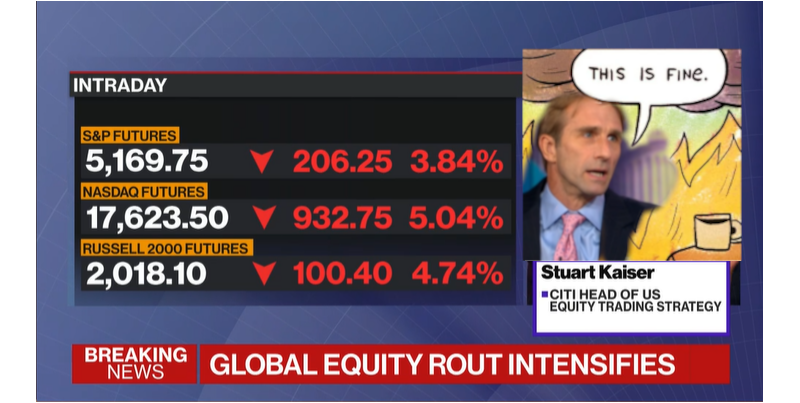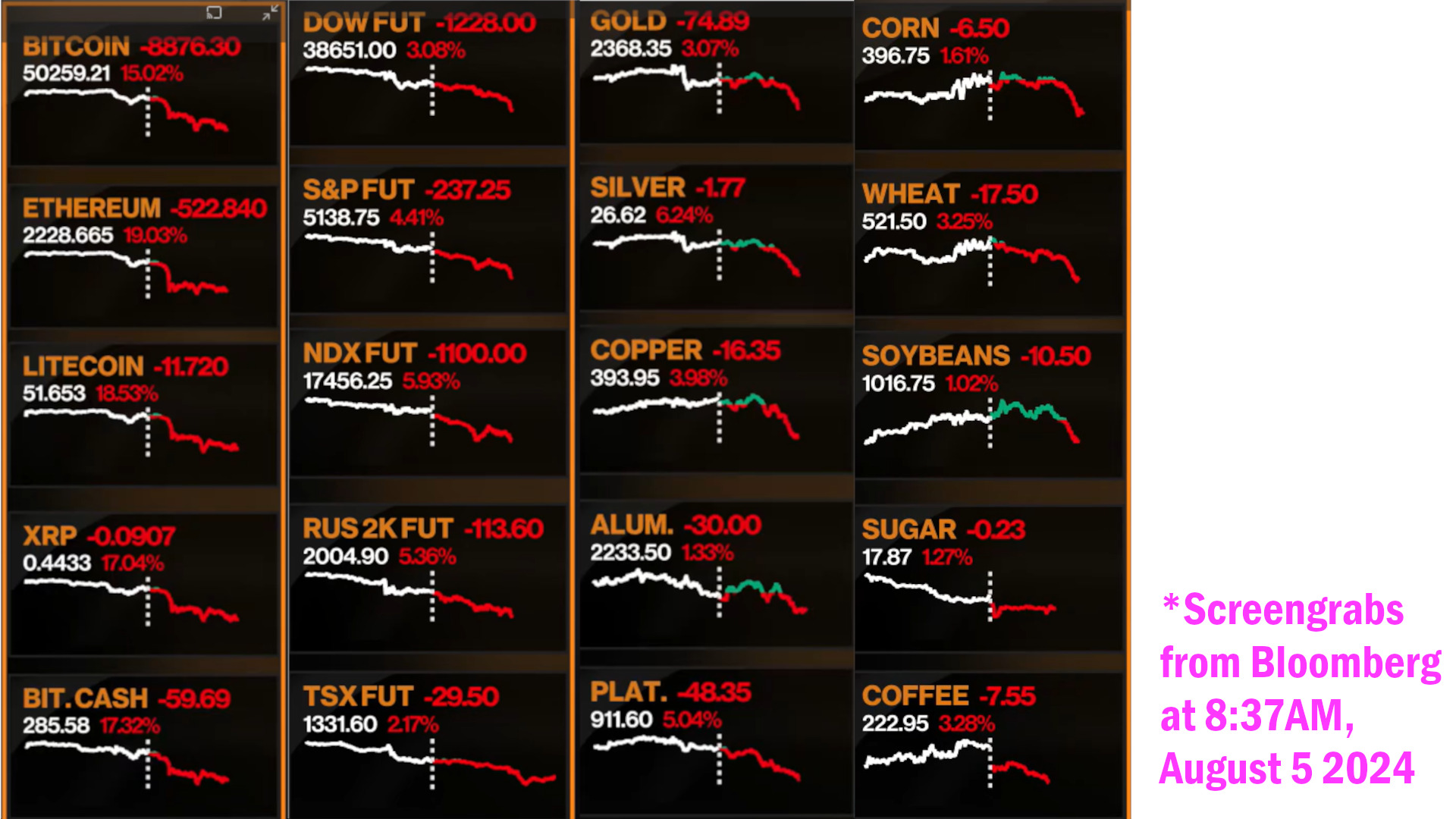Let's All Watch the Tech Economy Die

Line Goes Down
While everyone enjoys watching the Olympics, I'm having my own personal biannual sporting event: a stock market panic. Don't get me wrong, I'm not saying "sportsball": I enjoy watching baseball, basketball, and football (American and otherwise), and marvel at the prowess and grace of the world's greatest athletes. But I rarely seek them out, and if I'm not doing so with a friend, I'm almost never watching sports. When the economy starts to wobble, however, I will put on the free stream of Bloomberg and watch with glee and schadenfreude all day as "experts" and hosts alike do their best This is Fine Dog impression.
Maybe it's a trauma response to graduating college in 2009, an accident of birth timing that cut my expected lifetime wages in half. Or maybe I'm just a huge fucking nerd. Either way, last night before going to bed I saw as the East Asian stock market start to implode. On waking up this morning, Japan's Nikkei had closed down 12.5% (a percentage loss on par with 1929's Black Tuesday, it's the worst day in Japan since 1987, the beginning of the "lost decade"), South Korea's Kospi closed down 9%, and Taiwan's down 8.4%. These three stock indexes are heavily tech dominated, but even service-driven Singapore and India have had a bad three days. Crypto is collapsing, gold is down, the "volatility" index is exploding, and the US markets had their worst open since 2020. The treasury yield curve is dis-inverting (if you don't already know, I promise it doesn't matter what this means beyond "bad indicator") and the bond market moves are drawing comparisons to the financial collapse of 2008.
But even though all this started last week, I've only been paying the most mild attention. I mean, it couldn't feel further from the important stuff. The Bangladeshi student movement, rising up over the last month against a corrupt and nepotistic jobs law, generalized last week against the regime, and after incredibly bloody battles between police, protestors and regime supporters, this morning the movement seem to have successfully pulled off a revolution, as prime minister Sheikh Hasina has abdicated and fled the country after protestors stormed her official residence in Dhaka. Much like in Egypt in 2011, the army has moved in to "help" organize elections.
The IOF's criminal assassinations of Hamas leader and ceasefire negotiator Ismael Haniyah and Hizbollah commander Fuad Shukr could lead to a military response as early as today, and western countries are preparing their citizens to evacuate Lebanon as the odds of regional war intensify. The UK's ten month long participation in the Gaza genocide, alongside over a decade of increasingly mainstream anti-immigrant rhetoric, has lead to a week of anti-Muslim pogroms on the island, with anti-fascists putting their lives on the line to stop UK fash from lighting refugee hotels on fire.
Devastating mudslides in Kerala, news of a +50° summer in Antarctica, a second hurricane making landfall in the US, brutal wildfires in the PNW, ecopocalypse continues to drive despair. Meanwhile a stolen election in Venezuela puts the final nail in the coffin of the Pink Wave and boxer Imane Khelif, an Algerian woman in Paris, beat down an Italian Karen and an Aryan Hungarian so hard that the entire world started transvestigating her, but Khelif's already guaranteed a medal in a moment reminiscent of Jesse Owens' Olympic triumph in 1936.
Yes, that was just last week. But even through all that, some economic stories peaked through. US job numbers, despite being juiced harder than RFK Jr., last week returned a bad look as unemployment claims rose and job openings fell to a 2020 lockdown level. After a June 27 Goldman Sachs report finally said that the emperor, AI, had no clothes in a language tech grifters understand, the bubble has been starting to pop. OpenAI, valued at $80 billion, revealed it might be bankrupt by the end of the year, because AI is valueless and makes no money, while studies showed that products that mentioned AI in their marketing did less well, we may be witnessing the end of what tech reporter Ed Zitron calls The Rot Economy. And today it is tech--in the US, Japan, S. Korea and Taiwan--that is driving the market collapse.

Long term fans of All Cats Are Beautiful will probably be saying, "Vicky, didn't you predict this collapse already last March?" And while I'd love to be as bold as a professional economist and say "actually, the crisis is so bad my being wrong was on a long enough time frame actually a sign of how right I was", I lack the credentials or training to say so. I thought it was gonna happen last March, but it didn't, and it might not be happening now. I'm a girl with an internet connection. I don't own any stocks, have a degree in economics, or anything other than a fan's love of the game. That said, this morning it does seem like Biden and the Fed's quiet bank bail out bought the economy about 14 months, but the underlying crisis factors (tech bubble, Commercial Real Estate collapse, widespread scam economies, mass disabling event of COVID, and accelerating climate disaster) remain unchanged.
It's possible to watch all this collapse and enjoy it because us plebs have already been living in a recession since 2022. Biden-pilled liberals and economics writers alike have been calling proletarians Chicken Littles for a few years, saying this was a "vibecession", that the economy was strong and household confidence was false consciousness. Look at the fundamentals, you idiots, look at the stats! Nevermind that our bank accounts were empty, our rents were up, prices were skyrocketing and the vultures of legalized sports betting, payday loan apps and credit card default circled relentlessly. Anecdote is not the singular of data, they told us, while we watched more and more of our mutuals turn to less and less effective mutual aid funds to get by. The jobs opening numbers are strong, they said, as friends got laid-off and those looking for jobs couldn't even get an interview.
And if this is in fact the financial collapse it looks like it might be, and the tech sector which has driven the US economy for decades is in the process of meeting its demise, if financial services and commercial real estate are going to shit the bed, the economy that will emerge out of the other side is gonna be very different. Trump has recently been saying that if elected, on day one he is gonna "drill baby drill" and build US "energy independence". In classic fascist fashion, this is stolen valor, pure fantasy, Trump pre-emptively claiming credit for something that's already happened. While Democrats haven't been bragging about it, because they know that their voters know that it's dooming the fucking planet, under Biden the US has become the world's number one producer of fossil fuels, ahead of Russia, Saudi Arabia, everybody.
Advances in horizontal fracking techniques and regulatory opening up of oil fields has turned most of Louisiana and the Gulf Coast into a sacrifice zone in exchange for the US becoming history's most plentiful oil producer, which has driven much of the Building Back Better after the pandemic crash. If tech were to collapse, oil and the military industrial complex that is its number one consumer will take an even larger role in the US economy and political space. More and more the only thing the US has to offer the world is destruction.
Of course, there's still industrial agriculture, which might be in the process of producing our second pandemic in four years as H5N1 avian flu appears in more and more livestock and in the bodies of more and more workers across the Midwest, while the CDC sticks its fingers into its ears and whistles Dixie. Or our world class universities, which turn infinite tax free cash from FAFSA into real estate development schemes via the lives and bodies of debt-saddled students who will be paying off their educations, mostly provided by poverty-waged adjuncts, for 30 years. Meanwhile the people getting minimum-wage in university cafeterias have to move further and further away as said real estate schemes drive skyrocketing gentrification in and around the university.
Then there's our health care sector, where insurance companies make billions denying people coverage, while care facilities consolidate into larger and larger regional hospital conglomerates so miserable to work for that a nursing and doctor shortage was already a decade deep when COVID hit. And who could forget our invaluable intellectual property industries, entertainment, pharma and biotech, proudly perched atop hoards of accumulated human knowledge and focused on bleeding the rest of the world dry for a pittance of access.
Sure, when you describe it like that it all sounds wildly unsustainable. But Vicky, the fundamentals are strong! Look at housing values (not too close!) Look at consumer spending (only focus on 'high-income' consumers!) Look at the stock mark...oh shit no wait look away look away, we're doing fine, everything is fine, don't look down, we're good.
Under global capitalism, the "science" of Economics is best understood as equivalent to augury (the process in the Greek world of telling the future by the interpretation of the movements of birds); haruspicy (the Roman and pagan divination method using animal's entrails); sorcery or "witch-doctoring". To work within capitalist ideology, it has to look and sound like science, not magic, but much like the oracles of delphi, its practitioners are rewarded special considerations and attention by those in power no matter the accuracy or consistency of their predictions.
Today's imperial alchemists turn the chaotic randomness of economic activity and class war into neat, clean narratives, justifying the actions of those in power and giving their greed and violence legitimacy and capital T Truth. Those narratives work to explain what's happening...until they don't, until a truly epochal crisis and contradiction almost wipes everything out, at which point the leadership selects a high-priest of a different god, er, favors a different economic theory, one that can explain the previous failures and promise control over the next. All of it is a smokescreen hiding the real relations of raw colonial power, extractive violence and worker resistance that make up class society and racial capitalism.
Which is why, when the shit hits the fan, you can watch all the high minded justifications go up in smoke, watch the facade crack as the high-priests start talking about "investor sentiment", recognizing that this is a "panic", tiny admissions that ultimately these markets are just people, incredibly malicious and venal people but people in relation with one another, and the market is no more a stable and powerful entity outside or above society than anything else. "Please remain calm" instruct the court magicians, revealing the fundamental nature of their spells: most people do what they tell them to.
The pleasure in watching financial collapse is in being able to see through the bullshit, to see how empty and false all their knowledges are, to watch them scramble to cover their own asses at the expense of the next guy over. The utility is more debatable, although figuring out which sectors are driving the crisis often helps orient us toward weak points in their system. For example, the collapse in Commercial Real Estate means there will be a lot of big empty buildings to squat, takeover, make use of; we might help accelerate the death of tech by working to shut down senselessly emitting AI data centers and bitcoin mines.
It is not about celebrating the hardships that will inevitably emerge: it will always be us who has to pay for their busted casinos, their failed alchemical equations, their mislaid predictions and foolhardy theories. But we're always-already paying, we're already being punished, robbed and disposed of, already being destroyed by their economy. When they start to lose their footing too, it's a good opportunity to give them a shove.
